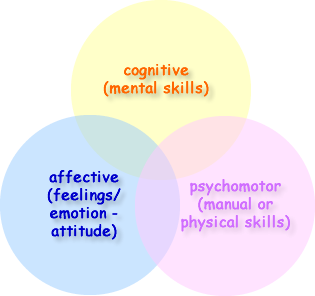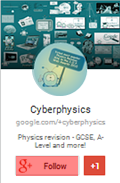|
|
|
Cognitive Learning
From 1948-1956, Benjamin Bloom headed an investigation into the classification of the levels of intellectual behaviour used within in the learning process.
It was concluded that there were three overlapping domains of educational activities: cognitive (mental skills), affective (feelings/emotion - attitude) psychomotor (manual or physical skills).

In teaching the Sciences cognitive skills are classed as the most important, but affective and psychomotor learning are also valuable. Modern syllabuses try to include aspects of all three, but generally fail at lower levels to truly assess a student's level or potential.
Bloom came to the conclusion that students' abilities could be measured along a continuum ranging from 'simple recall or recognition of facts', through increasingly more complex and abstract mental levels, to the highest order which is classified as 'evaluation'.
Cognitive Learning is concerned with the 'acquisition and use' of knowledge. It is predominant in the majority of courses as it is the easiest to assess using examinations.
It is demonstrated by:
 knowledge recall and knowledge recall and
 intellectual skills including: intellectual skills including:
- comprehending information given and recalling or recognising specific facts asked for in a question (ignoring irrelevant material);
- organizing ideas and applying taught procedural patterns;
- analysing and synthesizing data;
- applying knowledge to new situations;
- choosing among alternative approaches when problem-solving;
- evaluating ideas or actions.
There are six major categories, which are listed in order below, starting from the simplest behaviour to the most complex. The categories can be thought of as degrees of difficulties. That is, the first one must be mastered before the next one can take place. Verb examples that represent intellectual activity on each level are also listed.
Cognitive Skill Level |
What the level entails |
Examination question words associated with the level |
| Lowest level - Level 1 |
Knowledge: retention and retrieval
|
Rote learning of terminology, facts, theories, structures, methods and procedures, recall of data/dates etc. |
arrange, define, describe, duplicate, identify, know, label, list, match, memorise, name, order, outline, recall, recognise, relate, repeat, reproduce, select, state, |
| Level 2 |
Comprehension: understanding of the knowledge acquired in stage 1. |
This stage involves the ''internalisation" of knowledge, so that a student can describe and explain a problem in his/her own words or in another format.
To do that s/he needs to understand the meaning, be able to translate, interpolate, and interpret instructions and problems. |
classify, comprehend, convert, defend, describe, distinguish, discuss, estimate, explain, extend, express, generalise, give examples, identify, indicate, infer, interpret, locate, paraphrase, predict, recognise, report, review, rewrite, select, summarise, translate |
| Level 3 |
Application of the knowledge that has been learnt and understood by the student. Generalisations can now be made of how the specific knowledge applies in the real world. |
Recognition of which knowledge elements are applicable to a situation, and correctly applying them.
Using a concept in a new situation or
unprompted use of an abstraction. |
apply, calculate, change, choose, compute, construct, demonstrate, determine, discover, employ, illustrate, interpret, manipulate, modify, operate, practice, predict, prepare, produce, relate, schedule, show, solve, use, write |
| Level 4 |
Analysis: Looking at how the application of knowledge can be understood by looking for patterns that apply to it. |
Being able to take known facts and discover the connections between them resulting in a creative solution to a problem.
Ability to separates material (or concepts) into component parts so that its organizational structure may be understood.
Distinguishing between facts and inferences. |
analyse, appraise, break down, calculate, categorise, compare, contrast, criticise, diagram, deconstruct, differentiate, discriminate, distinguish, examine, experiment, hypothesise, identify, illustrate, indicate, infer, outline, question, relate, select, separate, test |
| Level 5 |
Synthesis: creation of new structures |
Builds up an explanation/prediction using diverse elements.
Put parts together to form a whole.
Builds a structure, pattern or new application of facts, theory, structures, methods from 'known ideas plus observation', with emphasis on creating a new meaning, structure to solve a problem (or understand something in a new way). |
arrange, assemble, categorise, collect, combine, compile, compose, construct, create, devise, design, develop, explain, formulate, generate, manage, modify, organise, plan, prepare, propose, rearrange, reconstruct, relate, reorganise, revise, rewrite, set-up, summarise, tell, write |
Highest level -
Level 6 |
Evaluation: Looking at the application of knowledge in a critical way.
Make judgments about the value of ideas or data collected
Suggest further investigations that can validate the proposal. |
Being able to appeciate the strengths and limitations of the application of knowledge that has been made.
Invent new structures based on observation of phenomenon which do not fit existing frameworks. |
appraise, argue, assess, attach, choose, compare, conclude, contrast, criticise, critique, defend, describe, discriminate, estimate, evaluate, explain, interpret, justify, judge, predict, rate, relate, select, summarise, support, value |
|

Follow me...




|







